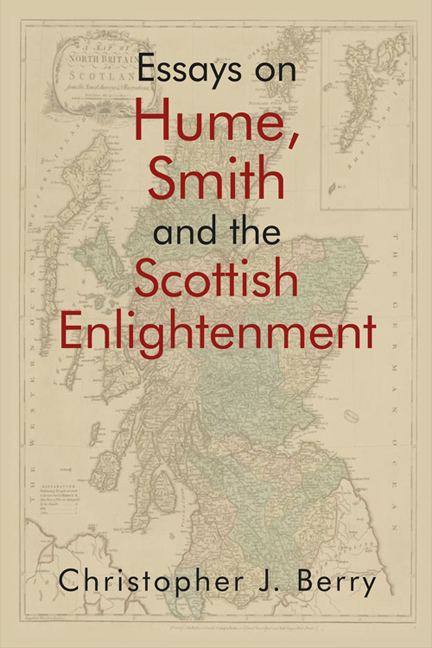15 - Hume on Happiness
Published online by Cambridge University Press: 06 May 2021
Summary
In a well-known passage at the conclusion of Book I of the Treatise, Hume confesses that his argument to that point has led him into a state of ‘philosophical melancholy and delirium’. Yet, in the same sentence, he admits that this condition is unsustainable. He proceeds to remark that this melancholy is alleviated by the ‘lively impression of his senses’. Continuing in first-person mode, he then, as examples of this liveliness, writes, ‘I dine, I play a game of backgammon, I converse and am merry with my friends’ so that, after ‘three or four hours’ amusement’, that mentally destabilising argument now appears ‘ridiculous’ (T 1–4–7.9/SBNT 269). He has shifted from being sad and melancholic to being merry and amused. It would seem unproblematic to associate merriment and amusement with happiness but, though the association is not false, it is incomplete, as Hume elsewhere appreciates. I here examine Hume's understanding of happiness, what it is and its role or significance. To help illuminate this last point, this examination will lead to a brief exploration of the relationship of Hume's views to an aspect of the relatively recent upsurge in ‘happiness studies’. This can be fairly described as an ‘upsurge’ because, of course, there is nothing novel about a philosophical interest in happiness.
From the perspective of intellectual history/philosophy, a distinction is often made between two senses of happiness: the eudaimonic and the hedonic. Each of these has its paradigmatic representative – Aristotle in the first sense and Bentham in the second. For Bentham, there is a ‘felicific calculus’; happiness is when the sum of pleasures is greater than sum of pains and it is the ‘fundamental axiom’ that the ‘greatest happiness of the greatest number’ is ‘the measure of right and wrong’ (Bentham 1948: 120; cf. 3, 127, 147). For Aristotle, happiness (eudaimonia) is a virtuous activity of the soul [and] … demands not only complete goodness but a complete life’ and the good life of virtue is one lived for its own sake; it is an entelechic fulfilment not a calculable contingency. To treat pleasure (hedone) as the end of activity is beneath true humanity. It is the masses (hoi polloi) or slaves who prefer a life of merely bodily pleasures (somatikon hedonon); a preference that exemplifies their quasi-animality (EN 1177a8/328).
- Type
- Chapter
- Information
- Essays on Hume, Smith and the Scottish Enlightenment , pp. 264 - 286Publisher: Edinburgh University PressPrint publication year: 2018



